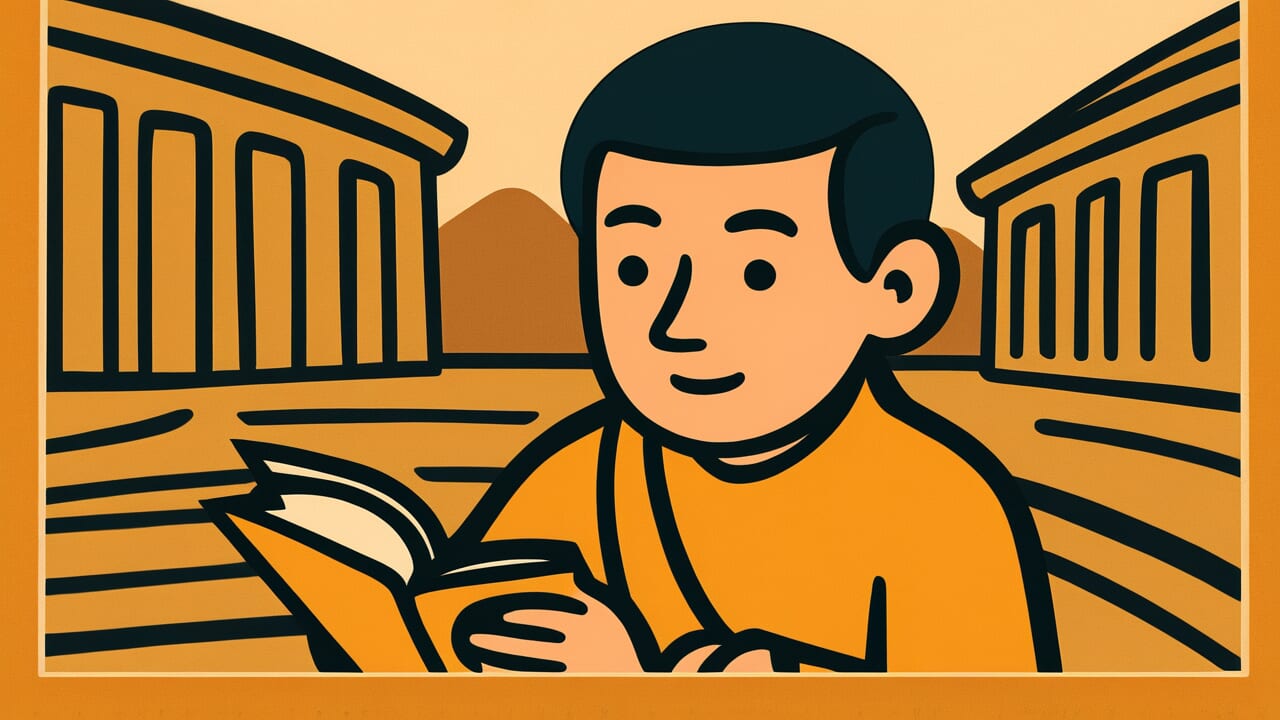How to Read “The hall is crooked and the sutra cannot be read”
Dō ga yugande kyō ga yomenu
Meaning of “The hall is crooked and the sutra cannot be read”
This proverb means that you cannot demonstrate your true abilities when the environment or conditions aren’t right.
No matter how skilled or talented you are, you cannot achieve good results if the basic environment needed to use those abilities isn’t in place.
People use this saying when someone fails or doesn’t meet expectations. Instead of blaming the person’s lack of ability, it points out problems with the environment or conditions.
It’s also used to emphasize the importance of preparing the right environment before starting something.
Today, we apply this proverb to many situations: workplace equipment and systems, learning environments, and living conditions.
It conveys a timeless truth. To bring out a person’s effort and talent to the fullest, you must first build an environment that supports them.
Origin and Etymology
No clear written records explain the origin of this proverb. However, we can make interesting observations from how the words are structured.
“Dō” means a Buddhist hall, specifically the main hall of a temple. “Kyō” refers to reading Buddhist sutras aloud, a practice called recitation.
The temple’s main hall is a sacred place where monks read scriptures aloud. But what would happen if the building itself was tilted or crooked?
If the floor tilted, your sitting posture would become unstable. If the pillars were warped, your mind couldn’t settle.
If the whole building creaked and groaned, you could never concentrate enough to read the sutras properly.
No matter how excellent the monk, no matter how much training they had, they couldn’t fulfill their duties if the building itself wasn’t sound.
This proverb likely emerged during an era when Buddhism was deeply woven into people’s daily lives.
By using temples as a familiar example, our ancestors wisely made the importance of environment easy to understand.
They expressed through the concrete image of a building how crucial the foundation is, not just ability or effort alone.
Usage Examples
- Assigning design work without even providing a new computer is like “the hall is crooked and the sutra cannot be read”
- Demanding results at a competition without securing a practice space is a case of “the hall is crooked and the sutra cannot be read”
Universal Wisdom
The proverb “The hall is crooked and the sutra cannot be read” has been passed down because it contains deep insight into the essential structure of human society.
We humans tend to focus only on visible results and outcomes. When someone fails, we think their ability or effort was insufficient.
But this proverb sounds a warning against such superficial thinking.
Human ability is never demonstrated in a vacuum. No matter how excellent the talent, it cannot bloom without soil to nurture and allow it to flourish.
This applies not just to individuals, but to organizations and entire societies. It’s a universal truth.
What’s interesting is what this proverb suggests about “where responsibility lies.” When results don’t come, we want to blame someone.
But what should really be questioned is whether we prepared an environment where that person could demonstrate their abilities.
Our ancestors understood that to nurture people and draw out their strength, preparing the environment must come first.
This wisdom is based on a warm view of humanity that believes in human potential and seeks to bring it out to the fullest.
When AI Hears This
Systems change researcher Donella Meadows ranked the effectiveness of system interventions into twelve levels.
Surprisingly, what most people try first—adjusting numerical targets or tweaking rules—are low-level interventions with little effect.
High-level interventions, on the other hand, involve changing “the system’s purpose” or “underlying paradigms.” This proverb demonstrates exactly this principle.
When a structural problem like a crooked building (high-level leverage) remains unsolved, working harder at the task level of reading sutras (low-level leverage) is pointless.
In corporate digital transformation, it’s like introducing the latest AI tools without changing the fundamental decision-making mechanisms or evaluation systems.
Meadows’ research shows that low-level interventions seem to have immediate effects but don’t last. High-level interventions take time but bring fundamental change.
What’s fascinating is that the human brain easily notices visible numbers and tools (low-level) but tends to overlook invisible structures and assumptions (high-level).
In other words, the fundamental problem of “the crooked hall” is hard to recognize, while attention focuses on the surface phenomenon of “cannot read the sutra.”
This proverb succinctly expresses the most important lesson in systems thinking: “If you’re going to intervene, aim upstream.”
Lessons for Today
What this proverb teaches us today is the importance of preparing the foundation before demanding results.
In work or study, we tend to blame ourselves or others: “Try harder” or “You’re not putting in enough effort.”
But stop and think for a moment. Do you really have the necessary tools? Is there an environment where you can concentrate? Is your physical and mental health maintained?
If you’re in a position to guide others, start by preparing the environment. When subordinates or juniors can’t demonstrate their abilities, reflect on whether you’ve provided conditions for them to work well before scolding them.
And if you’re struggling to produce the results you want, review your surrounding environment before blaming yourself.
Seeking necessary support is never a weakness. Rather, it’s a wise choice to demonstrate your abilities to the fullest.
To demonstrate ability, you need a stage worthy of it. Preparing the environment first—that’s the first step to opening up possibilities for yourself and those around you.


Comments